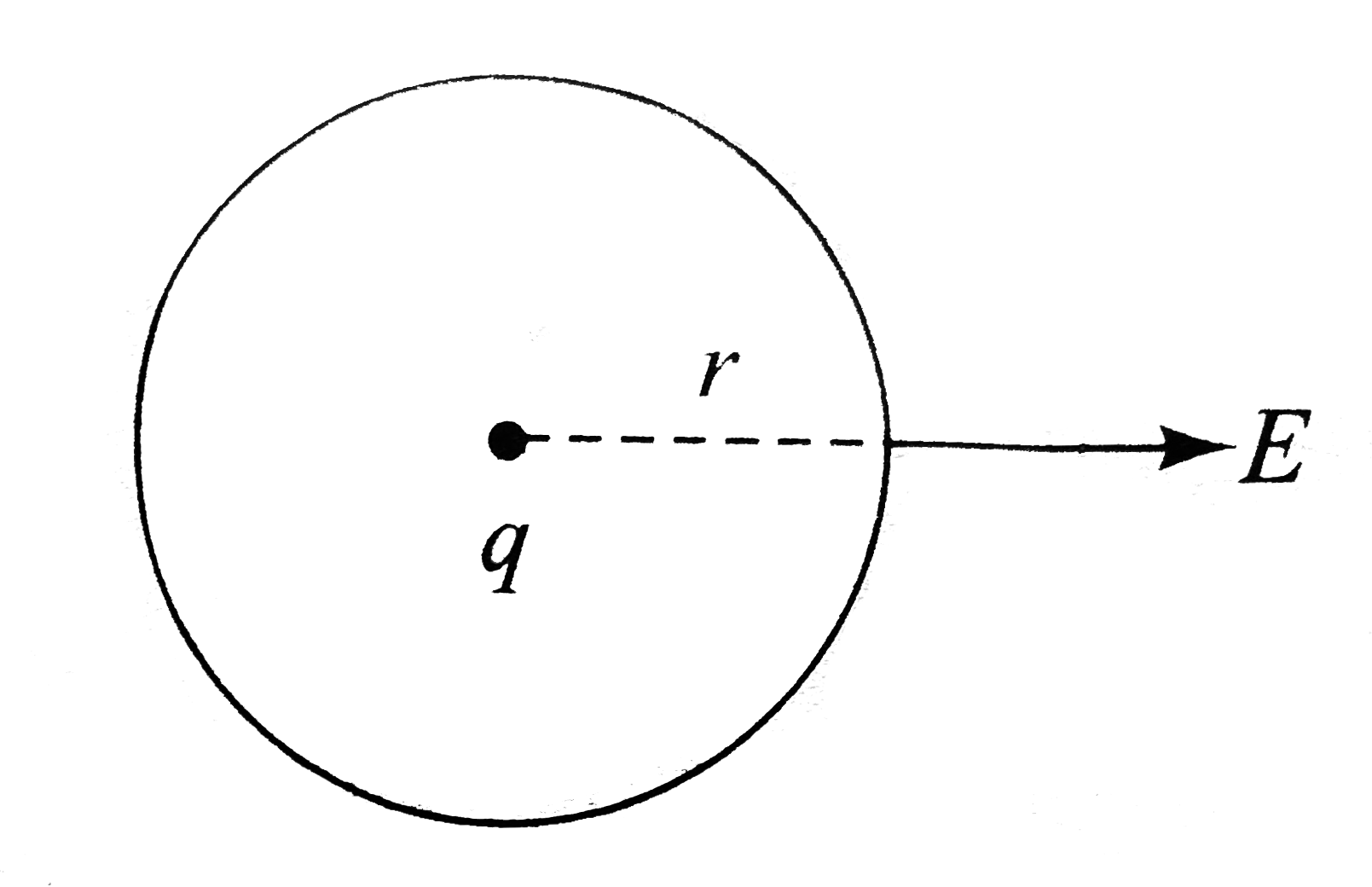If Coulomb's law involved (instead of , would Gauss's law still be true?
Let coulomb 's law involves . Now, let us find the
flux due to a point charge.

It means flux depends upon r, which is not true. So
Gauss's law will not be true. Because in Gauss's law,
flux through a closed surface depends upon the charge
present inside and not on the shape or size of the Gaussian
surface.
Topper's Solved these Questions
- BOOK - CENGAGE PHYSICSCHAPTER - ELECTRIC FLUX AND GAUSS LAWEXERCISE - Exercise 2.214videos
ELECTRIC FLUX AND GAUSS LAW
- BOOK - CENGAGE PHYSICSCHAPTER - ELECTRIC FLUX AND GAUSS LAWEXERCISE - Subjective12videos
ELECTRIC FLUX AND GAUSS LAW
- BOOK - CENGAGE PHYSICSCHAPTER - ELECTRIC FLUX AND GAUSS LAWEXERCISE - Example7videos
ELECTRIC FLUX AND GAUSS LAW
- BOOK - CENGAGE PHYSICSCHAPTER - ELECTRIC CURRENT AND CIRCUITEXERCISE - Interger8videos
ELECTRIC CURRENT AND CIRCUIT
- BOOK - CENGAGE PHYSICSCHAPTER - ELECTRIC POTENTIALEXERCISE - DPP 3.514videos
ELECTRIC POTENTIAL
Similar Questions
If Coulomb's law involved 1/r3 dependence (instead of 1/r2), would Gauss's law be still true ?
View SolutionAnswer carefully:
(a) Two large conducting spheres carrying charges Q1 and Q2 are brought close to each other. Is the magnitude of electrostatic force between them exactly given by Q1Q2/4πε0r2, where r is the distance between their centers?
(b) If Coulomb’s law involved 1/r3 dependence (instead of 1/r2), would Gauss’s law be still true ?
(c) A small test charge is released at rest at a point in an electrostatic field configuration. Will it travel along the field line passing through that point?
(d) What is the work done by the field of a nucleus in a complete circular orbit of the electron? What if the orbit is elliptical?
(e) We know that electric field is discontinuous across the surface of a charged conductor. Is electric potential also discontinuous there?
(f) What meaning would you give to the capacitance of a single conductor?
(g) Guess a possible reason why water has a much greater dielectric constant (= 80) than say, mica (= 6).View Solution
Knowledge Check
- Question 1 - Select One
Assertion: Column's law can be derived from Gauss's law.
Reason: Gauss's law can be derived from Coulombs law.Aif both Assertion and Reason are true and the Reason is correct explanation of the Assertion.BIf both Assertion and Reason are true but Reason is not the correct explanation of the Assertion.Cif Assertion is true, but the Reason is false.DIf Assertion is false but Reason is true. - Question 2 - Select One
The Bohr model for the H-atom relies on the Coulomb's law of electrostatics . Coulomb's law has not directly been varified for very short distances of the order of angstroms. Suppos-ing Coulomb's law between two oppsite charge +q1,−q2 is modified to ∣∣→F∣∣=q1q2(4πε0)r21r2,r≥R0
=q1q2(4πε0)r21R20(R0r)ε,r≤R0
Calculate in such a case , the ground state enenergy of H-atom , if ε0.1,R0=1ÅA−11.4eVB−7.9eVC−13.1eVD−15.2eV
Answer carefully : (a) Two large conducting spheres carrying charges Q1andQ2 are brought close to each other. Is the magnitude of electrostatic force between them exactly given by Q1Q24π∈0r2 where r is distance between their centers ?
(b) If Coulomb law involved 1/r3 dependence (Instead of 1/r2). would Gauss's law be still true ?
(c) A small test charge is released at rest at a point in an electrostatic field configuration. Will it travel along the line of force passing through that point ?
(d) What is the work done by the field of a nucleus in a complete circualr orbits of electron ? What if the orbits is elliptical ?
(e) We know that electric field is discontinnous across the surface of a charged conductor conductor. Is electric potential also discontinous there ?
(f) What meaning would you give to the capacity fo a single conductor ?
(g) Guess a possible reason why water has a much greater dielectric constant K=80 than, say mica (K=6).View SolutionGauss's law part-1
View SolutionGauss's law part-2
View SolutionIf It is 1r2.5 in place of 1r2, would Gauss's law still hold?
View SolutionWhich of the following statement(s) is/are correct? If the electric field due to a point charge varies as r^(-2.5) instead of r^(-2),then the Gauss law will still be valid. The Gauss law can be used to calculate the field distribution around an electric dipole. If he electric field between two point charges is zero somewhere,then the sign of the two charges is the same. The work done by the external force is moving a unit positive charge from point A at potential "V_(A)" to point B at potential "V_(B)" is,(V_(B)-V_(A))
View SolutionState and prove Gauss's law in electrostatics.
View Solution
